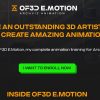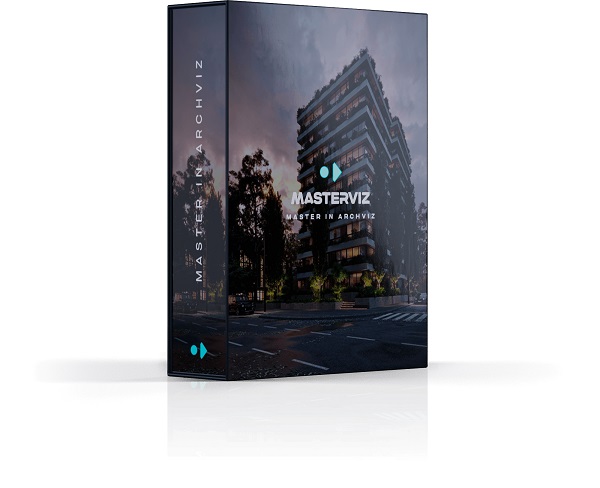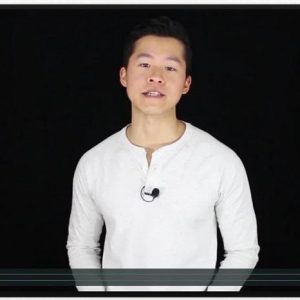Masterviz – OF3D Academy
$670.00 Original price was: $670.00.$35.00Current price is: $35.00.
Table of Contents
BEHIND EVERY REALISTIC PICTURE …
We believe that every professional who creates realistic images doesn’t do it magically.
Behind every fabulous visualization you create, there is a method.
Yes, we have developed this method.
We are aware that it is not the only way to achieve realism in rendering, but we guarantee that the way we teach is unique in the world and that anyone can learn.
A niche that has growing demand, is simple and has less hassle. The rendering market in Brazil and in the world is only growing. And the best: the competition for those who stand out is very low.
Have more autonomy. Conquer what many are looking for and never found: freedom. Be free to work wherever you want and for as many hours as you want.
Get where you never got before. Become the most sought-after and well-paid professional in the architecture field.
It’s not about pushing buttons. Much more than learning every detail of the software, understand how to create bold images by refining your look and exploring your creativity.
Do not waste time. What once took years to be learned within Archviz, now, with the right technology and method, you can do it in months (or even days!).
How much does it cost not to have all of this? If you were mastering realistic rendering today, and with that, you were earning 5, 10, 20, 50 thousand reais per month and you were available to work wherever you want with what you really love, what would you be doing?
DON’T WALK UNNECESSARY PATHS
Master the practice, learn the method and turn your images into real experiences.
We will teach you techniques and practices that we use every day in our studio, which is currently one of the largest in Latin America. You will save a lot of time and cut a lot of unnecessary paths.
The way we will guide you through the online classes will have one main objective: to give you all the methods and tools you need to become a high-performance Archviz professional. You don’t need to master any software, because we’ll get you there.
This is the time to explore your full creative potential, even if you think this was never your strong point.
WHAT WILL YOU LEARN?
FUNDAMENTALS
There is no practice without theory! Just like in the gym, first you have to understand the movements and then execute them. Within Archviz it is no different, it is necessary to equip yourself with some specific knowledge before getting your hands dirty. It would be a big mistake to underestimate fundamental concepts, such as photography, rules of composition, lighting, materials, colors, etc. Therefore, here you will build the necessary theoretical foundation to create breathtaking visualizations!
LIGHTING
Lighting is one of the main pillars behind a high-level rendering. This pillar can turn your render into a highly realistic view, or destroy it completely. Here’s one of the most essential parts of rendering for architecture: conveying emotions and telling stories — and that can’t be done without light
MATERIALS
We have been in contact with different materials and textures for a long time. This means that our senses are absolutely used to observing and feeling the different surfaces around us. Therefore, knowing how to observe the world around us, and being able to accurately reproduce the way materials behave in real life, is an indispensable skill for an elite 3D artist.
CAMERAS
Within the 3D world, cameras are the artist’s eyes. What’s the best angle? How to frame what really matters? What details, highlights and aspects of the scene do you need to highlight? In this module, all these and many other questions will be answered. In the end, you’ll know everything you need to be able to position and configure your cameras – like a pro!
MODELING AND RENDER SETUP
Theory without practice is worthless! It is necessary to know how to give importance to the technical details of 3D. When the objective is maximum quality and execution speed, having independence when modeling and knowing how to configure the render is crucial. With the knowledge acquired in this step, you will have the necessary confidence to never become a hostage of “ready blocks”.
INTERNAL, EXTERNAL SCENES AND HUMANIZED PLANTS
So you already have the theory, practice and domain of the software. The time has come to put it all together and live firsthand what it really is to be a 3D artist. For that, we’ll teach you the entire workflow, from start to finish, to produce complete scenes, from the simplest to the most complex. With this, you will not only apply everything you’ve learned so far, but you’ll also be able to understand in a practical way how to be efficient and productive when working in the most diverse scenarios and situations – and always at the highest level!
POST PRODUCTION
A quality render comes out straight from Corona. However, the truth is, there are always tweaks and refinements that can take your visualizations to the next level, and we call that “post-production”. In OF3D Masterviz you will learn to use Photoshop to extract the maximum potential from your visualizations.
ADVANCED TECHNIQUES
If you are one of those who are not satisfied with the shallow, with the superficial, you are in the right place. The elite of the Archviz market does not belong to those who settle down, but to those who seek to use the best techniques and processes. With that in mind, we decided to open the game and show you what to do to achieve technical and conceptual mastery of architectural visualization.
BONUS
OF3D Masterviz is not just any 3D course. We take the quality of education we deliver seriously, and our greatest desire is to see you — yes, you — take off in your career as a 3D artist. So, so that you can start your journey, we will present you with a library of blocks and materials of the highest quality — and curated! In addition, we will provide several practical recorded tutorials to help you solve complex problems that appear in everyday life, with tips and tricks.
WHO IS THE COURSE FOR?
starting from scratch
The training is complete, practical and focused on results, you can learn from scratch and you just need to follow the methodology strictly. The training modules were designed in a democratic way, so that the greatest number of people can understand the applied techniques.
3D Artists
For artists who want to take a step further in the quality of their render. In the course you will learn absolutely everything you need to know to become a high performance professional, creating really realistic images.
Architects / Interior Designers
Professionals who want to improve the presentation of their projects at a professional level, reaching better clients. In the course you will learn to focus on what really matters to get your client’s attention.
CONHEÇA O MASTERVIZ POR DENTRO
START HERE
- Welcome To Masterviz
- How To Take The Most
- Out Of The Training
- How Does The Support Work
- Student Registration
- Join Facebook Communities
- Join The Telegram Channel
- How To Request Student License For The Software
- How To Request My Masterviz Completion Certificate
THEORY
- What Programs We Will Use
- Can I Use Other Programs
- Download And Install 3DsMax
- Download And Install Chaos Corona
- Download And Install Vray
- Configuring 3DsMax
- 3DsMax’s Interface
- Corona’s Interface
- Poly Create And Modify
- Spline Create And Modify
- Basic Commands
- Pivot
- Snap
- Right Hand Rule
- Exercise
- 3d Artist
- How To Get A Realistic
- Rendering
- References
- Pure Ref
- Modeling
- Materials
- Illumination
- Camera
- Lens Effects
- Mood
- Composition Rules
- Image Composition
- Helper
- Colors
ILLUMINATION
- Start
- Light Temperature
- Examples
- Base Scene
- Environment
- Corona Light
- Corona Light Material
- Corona Sun And Sky
- Corona Sun Parameters
- Corona Sun Geolocalization
- Overcast Corona Rectangle
- Complementary Lights
- Lightmix
- Internal Sun
- External Hdri
- Multiple Environments
- Exercise
- Albedo – Bursting Light
INTRODUCTION TO MATERIALS
- Introduction
- Compact Ofdterial Editor
- Interface Compact Editor
- Glasses
- Metals
- Plastic
- Porcelain Tiles
- Tessellation
- Saving Your Materials
- Pbr Materials
- Pbr Maps
- Granite Compact
- Granite Slate
- Wood
- Brick
- Corona Color Correct
- Poliigon Converter Ofdterial
- Create Your Maps
- Uvwmap
- Corona Library Materials
- Quixel And Bridge
- Exercise
CAMERAS:
- Viewport Display
- Photographic Parameters
- Dof
- Motionblur
- Tilt And Shift
- Projection And Vr
- Camera Clipping
- Exercise
MODELING
SUB MODULE | BASIC MODELING
- Wine Cup
- Vase
- Table
- Console Table
- Side Table 1
- Side Table 2
- Curve Bench
- Floor Generator
MODELING
SUB MODULE | LIVING
- First Steps
- Importing The Dwg
- Project
- Building The Walls
- Floor And Plaster
- Window Frame
- Island Furniture
- Panels
- Tv Furniture
- Kitchen Furniture
- Door And Window
- Stove And Sink
- Plaster Moulding
- Exercise
MODELING
SUB MODULE | EXTERNAL
- Reading The Project
- Importing From Cad
- Lines
- Walls
- Beam And Grill
- Floor And Ceiling
- Frames
- Windowsill And Brise
- Mirroring The Pavement
- Creating The Tower
- Crowning And Cleaning
- First Floor
- Garage’s Cover
- Street And Curb
- Exercise
MODELING
SUB MODULE | ASSETS
- Introducing The Marvelous Designer
- Modeling A Cushion
- Modeling A Quilt
- Modeling A Pillow
- Complete Bed: Lower Base
- Complete Bed: Sheet
- Complete Bed: Quilt
- Complete Bed: Pillows
- Complete Bed: Blanket
- Complete Bed: Final Adjustment
- Complete Sofa: Inserting The Reference
- Complete Sofa: Low Poly Base
- Complete Sofa: High Poly Base
- Complete Sofa: Creating Upholstery
- Complete Sofa: Replacing And Adjusting Upholstery
- Complete Sofa: Sofa Feet
- Complete Sofa: Adding Seams
- Complete Sofa: Final Adjustments
- Modeling A Refrigerator: Inserting A Reference
- Modeling A Refrigerator: Base And Upper Doors
- Modeling A Refrigerator: Panel And Door Logo
- Modeling A Refrigerator: Lower Door
- Modeling A Refrigerator: Rubber Doors
- Modeling A Refrigerator: Feet
- Modeling An Air Conditioner: Inserting A Reference
- Modeling An Air Conditioner: Separating The Front Part From The Base
- Modeling An Air Conditioner: Cuttings On The Base
- Modeling An Air Conditioner: Front Part
- Modeling An Air Conditioner: Texts And Logo
- Modeling An Air Conditioner: Final Adjustments
- Modeling Personalized Cushion
- Modeling Carpet
- Modeling Towel
- Modeling Curtain
CORONA MATERIALS
SUB MODULE | INTRODUCTION
- What Are Materials?
- Introduction
CORONA MATERIALS
SUB MODULE | CORONA LEGACY MATERIAL
- Interface
- Diffuse
- Translucency – Concept
- Translucency – Practical Example 1
- Translucency – Practical Example 2
- Reflection – Introduction
- Reflection – Level
- Reflection – Color
- Reflection – Fresnel Ior
- Reflection – Glossiness
- Reflection – Conclusion
- Anisotropy – Amount
- Anisotropy – Rotation
- Refraction – Concept
- Refraction – Parameters
- Refraction – Level
- Refraction – Color
- Refraction – Glossiness
- Refraction – Ior
- Refraction – Dispersion
- Refraction – Thin
- Refraction – Caustics
- Refraction – Conclusion
- Opacity – Introduction
- Opacity – Level
- Opacity – Color
- Opacity – Opacity Vs Refraction
- Opacity – Practical Example 1
- Opacity – Practical Example 2
- Opacity – Clip
- Displacement
CORONA MATERIALS
SUB MODULE | CORONA PHYSICAL MATERIAL
- Introduction
- Apply Preset
- Metalness
- Base Layer – Introduction
- Base Layer – Level And Color
- Base Layer – Roughness
- Base Layer – Ior
- Base Layer – Bump
- Base Layer – Edge Color
- Base Layer – Anisotropy
- Base Layer – Translucency
- Base Layer – Conclusion
- Refraction – Theory
- Refraction – Practical Example
- Clearcoat Layer – Introduction
- Clearcoat Layer – Car Paint
- Clearcoat Layer – Car Paint (Corona Physical Material)
- Clearcoat Layer – Amount
- Clearcoat Layer – Ior
- Clearcoat Layer – Roughness
- Clearcoat Layer – Bump
- Clearcoat Layer – Absorption
- Clearcoat Layer – Conclusion
- Sheen Layer – Introduction
- Sheen Layer – Sheen Vs Corona Legacy Material
- Sheen Layer – Parameters
- Sheen Layer – Practical Example
- Sheen Layer – Conclusion
CORONA MAPS
SUB MODULE | CORONA AMBIENT OCCLUSION
- Introduction
- General Parameters
- Excludes
- Practical Example 1 – Aged Wood
- Practical Example 2 – Ctexmap
- Conclusion
CORONA MAPS
SUB MODULE | CORONA BITMAP
- Introduction
- Corona Bitmap Vs Bitmap
- Uvw Mapping
- Environment Mapping
- Dome Mode
- Crop / Place
- Channel Outputs
- Bitmap
- Filtering
- Conclusion
CORONA MAPS
SUB MODULE | CORONA BUMP CONVERTER
- Introduction
- Remembering The Concept Of Bump
- A Problem With 3ds Max
- Practical Examples
- Parameters
- Conclusion
CORONA MAPS
SUB MODULE | CORONA COLOR
- Introduction
- Solid Color
- Solid Hdr Color
- Kelvin Temperature
- Hex Color
- Output Multiplier
- Alpha
- Input Values Are In Linear Color Space
- Conclusion
CORONA MAPS
SUB MÓDULO | CORONA COLOR CORRECT
- Introduction
- Input
- Brightness
- Contrast
- Saturation
- Hue
- Gamma
- Gamma And Saturation In HDRI
- Temperature
- Green-Magenta Tint
- Invert Colors
- Exposure
- Tint
- Lut
- Curves
CORONA MAPS
SUB MODULE | CORONA DISTANCE
- Introduction
- Distance From
- Distance Near And Distance Far
- Color Inside
- Using Maps
- Distance Scale
- Practical Example 1 – Chaos Scatter
- Practical Example 2 – Asphalt
CORONA MAPS
SUB MODULE | CORONA MIX
- Introduction
- Mix Operation – Add
- Mix Operation – Subtract
- Mix Operation – Multiply
- Mix Operation – Mix
- Mix Amount
- Perform Mixing In Srgb Space
- Multiplier
- Contrast
- Practical Example 1 – Graffiti
- Practical Example 2 – Wet Glass
CORONA MAPS
SUB MODULE | CORONA MULTIMAP
- Introduction
- Randomize By – Primitive, Sub-Primitive, Polygon And
- Mesh Element
- Randomize By – Decal
- Randomize By – Instance
- Randomize By – Material G-Buffer Id
- Randomize By – Object G-Buffer Id
- Randomize By – Material Name
- Randomize By – Face Material Id
- Batch Load Textures
- Other Parameters
- Practical Example 1 – Floor
- Practical Example 2 – Slatted
- Practical Example 3 – Trees
CORONA MAPS
SUB MODULE | CORONA NORMAL
- Introduction To The Normal Map
- Creating A Normal Map From A 3d Model
- Creating A Normal Map From A Diffuse Map
- Parameters – Input Image And Strength Mult
- Parameters – Add Gamma To Input
- Parameters – Rgb Channels Manipulation
- Parameters – Additional Bump Mapping
CORONA MAPS
SUB MODULE | CORONA ROUND EDGES
- Introduction
- Radius
- Mode
- Samples
- Effect Includes/ Excludes
- Additional Bump Mapping
- Conclusion
CORONA MAPS
SUB MODULE | CORONA TRIPLANAR
- Introduction
- Parameters – Input Maps
- Parameters – Blending Amount
- Parameters – Mapping Space
- Parameters – Scale
- Parameters – Offset And Rotate X, Y, Z
- Practical Example – Fabrics
- Conclusion
CORONA MAPS
SUB MODULE | CORONA UVW RANDOMIZER
- Introduction
- Understanding The Concept
- Parameters – Randomize By, Input And Seed
- Parameters – U And V Offset
- Parameters – W Rotation
- U And V Scale Parameters
- Tiling – Parameters
- Practical Example – Ripped
INTERIOR SCENES
SUB MODULE | 3D BLOCKS
- 3d Blocks
- Sketchup Blocks – Max And Corona
- Exercise
- Free 3d Blocks
- Relink Bitmap
- Websites To Download 3d Blocks
INTERIOR SCENES
SUB MODULE | IMAGE PUBLISHING
- Image Publishing
INTERIOR SCENES
SUB MODULE | CONCEPT SCENE
- References
- Modeling The Walls
- Camera And Preview Light
- First Blocks
- Merge
- Texturing The Scene
- Final Adjustments
- Configuring The Rendering
- Final Rendering
- Create Your Versions
INTERIOR SCENES
SUB MODULE | BATHROOM
- Reference And Mood
- Modeling
- Texturing
- Blocks
- Refinement
- Result
- Blue Hour
- IES
INTERIOR SCENES
SUB MODULE | OVERCAST APARTMENT
- Overcast Reference
- 3D Model
- Camera Light And Texture
- Light Refinement
- Round Edges
- 3D Blocks
- Scene Composition
- Cameras
- Background
- Hide Camera Objects
- DOF
- Fluted Glass
- Corona’s Post-Production
- Configuring The Rendering
- Batch Render
- Rebusfarm
- Photoshop Post-Production
- Exercise
INTERIOR SCENES
SUB MODULE | BLUEHOUR APARTMENT
- Blue Hour Reference
- Environment Adjustments
- Lightmix
- Configuring The Rendering
INTERIOR SCENES
SUB MODULE | SUN FLAT
- Reading The Project
- Wall Modeling
- Kitchen Modeling
- Carpentry Modeling
- Frames
- References
- Textures
- Corona Sun
- Scene Composition
- Closed Cameras
- Open Cameras
- Render
- Post-Production
- Result
- Exercise
INTERIOR SCENES
SUB MODULE | LOFT GOLDEN HOUR
- Sketchup Project
- Importing The Sketchup Project
- Organization
- Textures
- Scene Composition
- Cameras
- Golden Hour
- Overcast
- Night
- Multiple Environments
- Saving Different Moods
- Flash
- Exercise
INTERIOR SCENES
SUB MODULE | EXERCISE
- Exercise
INTERIOR SCENES
SUB MODULE | 360 VIRTUAL TOUR
- Virtual Tour
- Cameras
- Roundme
EXTERIOR SCENES
SUB MODULE | HOUSE OF SAND
- Reading The Project
- Importing The Boards
- First Floor Walls
- First Floor Frames
- First Floor Pool
- Upper Floor
- Terrain
- Camera One
- Hdri
- Corona Scatter
- Textures
- Proxy
- Caustics
- Finish
- Post-Production
- Camera Options
- Corona Distance Grass
- Exercise
EXTERIOR SCENES
SUB MODULE | CAR SCENE
- Download The Car
- Backplate
- Background
- Perspective Match
- Direct Visibility
- Shadow Catcher
- Exercise
EXTERIOR SCENES
SUB MODULE | CIRQUA APARTMENTS
- Bkk Architects Reference
- Modeling Organization
- Textures
- Illumination
- Asphalt Mixer
- Surrounding
- Forest
- Vegetation
- Cameras
- Exercises
EXTERIOR SCENES
SUB MODULE | TERRAINS
- Important To Know
- Terrain
- Boolean
- Sidewalks
- Glue
- Terrain
EXTERIOR SCENES
SUB MODULE | STREETS
- Streets
- Straight Street
- Curved Street
- Curved Curb
- Refinement
EXTERIOR SCENES
SUB MODULE | FOREST PACK
- Forest pack
EXTERIOR SCENES
SUB MODULE | ASPHALT
- Slate Material Part 01
- Slate Material Part 02
- Slate Material Part 03
- Asphalt Street
- Crosswalk
- Bump And Reflection
- Yellow Stripes
- Wheel Marks
- Crossing
- Water Puddles
EXTERIOR SCENES
SUB MODULE | KAISERGARTEN
- Project
- Preparation
- Basic Light And Camera
- Tower Texturization
- Scatter
- Trees
- Surrounding
- Asphalt
- Curtains
- Camera 50mm
- Camera 21mm
- Camera 28mm
- Landscaping Camera 28mm
- Detail Camera150mm
- Bluehour Cam 35mm
- Entry Camera 28mm
- Exercise
EXTERIOR SCENES
SUB MODULE | PHOTOMONTAGE
- Preparation
- Perspective Match
- Light
- Post Production
- Exercise
PHOTOSHOP POST-PRODUCTION
SUB MODULE | INTRODUCTION
- Photoshop Post-Production
- File Organization
- Composing The Render Elements
- General Adjustments And Corrections
- Color Adjustments
- Final Adjustments
PHOTOSHOP POST-PRODUCTION
SUB MODULE | EXTERNAL SCENES
- Composing The Render Elements
- Adding People
- Color Adjustments And Final Finishing
PHOTOSHOP POST-PRODUCTION
SUB MODULE | INTERNAL SCENES
- General Post-Production
- Adding People
PHOTOSHOP POST-PRODUCTION
SUB MODULE | EXTRAS
- Assembling A Panorama
- Removing Texture Repetition
FLOOR PLAN
- Reading The Dwg Project
- Importing The Dwg To Max
- Architecture Modeling
- Composing The Room
- Composing Areas
- Ph Materials
- Ortographic Camera
- Illumination
- Rendering And Post-Production
- Humanized Floor Plan Hdri
- Exercise
- 3D Physics Model
ADVANCED
SUB MODULE | ADVANCED GLASS
- Colored Glass
- Etched Glass
- Fluted Glass
- Fogged Glass
- Rain Glass
- Glass With Fingerprints
ADVANCED
SUB MODULE | WALL
- Corona Mix – Graphite
ADVANCED
SUB MODULE | REFERENCES IN PRACTICE
- Corona Mix – Graphite
ADVANCED
SUB MODULE | MAP
- Corona Triplanar
- Unwrap Map
CHAOS CORONA
SUB MODULE | COMMON
- Common
CHAOS CORONA
SUB MODULE | SCENE
- Progressive Render Limits
- Save Resume Rendering
- Render Overrides
- Denoising – Render Selected
- Scene Environment
CHAOS CORONA
SUB MODULE | PERFORMANCE
- Global Illumination
- Performance Settings
- Displacement – Interactive
- Caustics – Uhd Cache
CHAOS CORONA
SUB MODULE | SYSTEM
- System
CHAOS CORONA
SUB MODULE | CORONA 7
- Corona 7 New Features
- Old Scenes
- Physical Material
- Metal
- Material Presets
- New Material Library
- Corona Converter
- Prg Sky
- Coronal Physical Material Properties
CHAOS CORONA
SUB MODULE | CORONA 8
- Corona 8 Updates
- Decals
- Chaos Cosmos
- Chaos Scatter
- Frame Buffer
BONUS 3D MODEL LIBRARY
- Decorations Sets
TUTORIALS
- Lighting With Background
- Caustics
- Motion Blur In Rendering
- Volume Light
- Realistic Textures In 1 Click
- Distributed Render
- Backburner Using 1 Computer
- Inserting 2d People Inside The Render
- How To Make The Render Work For You
- 1-Click Modeling
- In Search Of The Lost Texture
- Modeling The Coronavirus
- 3d Humanized Plant
- Making A Simple Scene From Scratch
- Furry Rug In The Render
- Depth Of Field
- Quixel Megascans
- Realistic 3d Water
- Scatter Grass Distribution
- Finding The Size Of A Render
- How To Make A 360° Render
- Wood Slatted Texture
- Sketchup Blocks
- Pretty Social Media Render
- 3d Rendering A Logo
- 13 Ways To Optimize A 3d Scene
- Modeling A Wood Deck In 1 Click
- Realistic Wood Deck Texturing + Uvw Randomizer +
- Multimap
- Hair And Fur Straw Hat Cover
- 3DsMax Animation
- Post-Production In Render
- How Not To Light A Scene
- Volumetric Light – Car Headlights
- Chamfer On The Edges
Sales Page:_https://of3dacademy.com/masterviz/











